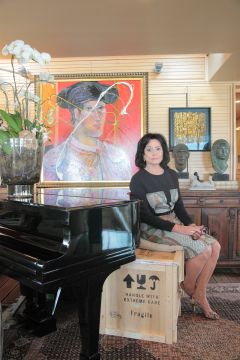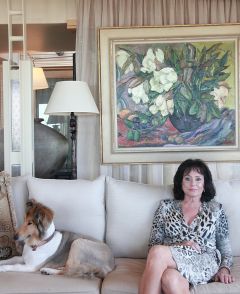Archived
A Woman of Substance
3 Nov 2015
Caro Wiese is a lover of beautiful things. This understated collector, who recently joined the board of Strauss & Co, the largest fine art auction house in South Africa, talks of her enduring love for art and literature.

In his well-known 2006 essay on tennis marvel Roger Federer, author David Foster Wallace remarked that, journalistically speaking, there was ‘no hot news’ to offer about the dapper Swiss athlete and anything one wanted to know was ‘all just a Google search away’.
The same cannot be said of Caro Wiese. This retiring Cape Town publisher and collector, who recently assumed a directorship at leading auction house Strauss & Co, has achieved something remarkable for a woman of her stature: privacy. This is no mean feat.
Two formidable and highly visible men feature prominently in Namibia-born Caro’s life story. The first is her father, Japie Basson, a colourful politician and journalist, referred to as ‘the complete politician’ and often likened in the Afrikaans press to an Atlantic petrel for his indomitable spirit and endurance. Then there is her husband, retail mogul Christo Wiese, hailed by Forbes as ‘one of the continent’s most successful entrepreneurs’.
But this is well known, all just a Google search away. Beyond the abbreviated details of Caro’s biography scattered online, there is, however, an untold story, one in which art, books and a Clifton home all feature centrally.
This untold story begins in 1950, three years after the arrival of Japie and Clare Basson in Namibia, then a South African protectorate. Politically active since his days as a law student at Stellenbosch University, Japie was dispatched to Windhoek as chief secretary of the United National South-West Party, an organisation with affiliations to Jan Smuts and his United Party.
Life in Windhoek wasn’t all politics. Clare, who is originally from Kenhardt in the Northern Cape and currently lives in a bungalow adjacent to her first-born of two daughters in Clifton, befriended Olga Levinson, a prominent society lady married to mining magnate Jack Levinson. An art critic and dealer, Olga introduced the Bassons to esteemed local painters including Adolph Jentsch, Fritz Krampe and Otto Schröder.
Their work, says Caro, ‘still resonates with me strongly today’. She adds that her art collection pays tribute to this post-war era. But art is not the sole measure of her early childhood. ‘From a young age I shared the love of books with my father,’ says Caro, who in 2004 established the private publishing house Politika to collect her father’s various political writings. Theatre and music also ranked highly as interests. ‘Both my parents loved music,’ elaborates Caro. ‘There was always background music in the evenings, the cocktail hour.’ Her family’s tastes were worldly and liberal, much like their politics. Caro recalls violin concertos, songs by Edith Piaf and Cesária Évora, New Orleans jazz and zither-infused music, in particular the score for the British noir film The Third Man (1949) starring Orson Welles as Harry Lime.
In 1950, Japie joined the National Party and was elected to represent the Namib constituency. His ‘strong convictions’, as Caro puts it, saw him expelled from the party nine years later by its leader, then Prime Minister Hendrik Verwoerd, for opposing the abolition of black representation in parliament. The family decamped for Cape Town. An unflappable public figure, Japie maintained his involvement in politics, both as an organiser and writer. Caro variously characterises her father, who in 1977 cofounded the Progressive Federal Party (a precursor to the Democratic Alliance), as a ‘democrat’, ‘republican’ and ‘public intellectual’.
His strongly individualist streak rubbed off on his daughter, who defied his wishes for her to further her studies at Stellenbosch University by instead opting to study Afrikaans, English and history at the University of Cape Town. After graduating, Caro spent a year working at the South African embassy in London. In 1973, she took up a job as an editor at Human & Rousseau, the Afrikaans-language publishing house founded in 1959 and home to big-name authors, such as Breyten Breytenbach, André Brink and Karel Schoeman.
Two years later she married Christo, a retail entrepreneur who, like Japie, is a law graduate of Stellenbosch University. The couple have three children. Of her husband, whose retail empire was founded upon a modest four-store discount clothing chain from Uppington in which his family had invested in 1965, Caro says that he shares her interests in art, books, music and travel. ‘He has always supported my interest in bringing together a personal collection,’ she says.
 Her decision to take up a non-executive position at Strauss & Co, which has achieved many records for post-war artists favoured by Caro, is based on her long-standing interest in art. It is an interest shared by her husband who, shortly after their marriage, presented her with an exquisite charcoal nude by émigré painter Jean Welz. A cherished possession, she displays it in a private space in her home.
Her decision to take up a non-executive position at Strauss & Co, which has achieved many records for post-war artists favoured by Caro, is based on her long-standing interest in art. It is an interest shared by her husband who, shortly after their marriage, presented her with an exquisite charcoal nude by émigré painter Jean Welz. A cherished possession, she displays it in a private space in her home.
Caro’s art collection, while diverse in style and range, is focussed on mid-20th-century South African artists. Her collection includes a number of botanical still lifes by the expressionist painter Irma Stern, sculptures by Lippy Lipshitz and Gerard de Leeuw, as well as paintings by Alexis Preller and Walter Battiss, modernist painters who quested to define indigenous themes and symbols in their work.
In recent years she has begun to look at contemporary artists. ‘I am slowly coming around,’ she smiles while looking at a large oil by contemporary painter Georgina Gratrix temporarily installed in the Strauss boardroom. Gratrix is not in her collection, but she does have two totemic figures by Deborah Bell. She also collects William Kentridge, whose work Caro was introduced to by Amanda Botha, a well-known Afrikaans journalist and curator.
Many people have contributed to shaping Caro’s connoisseurship. Aside from her parents, Caro mentions her long-time friend Marianne Louw, who not only sharpened her interests but also encouraged specific additions that contributed significant value to her collection. Abstract painter Christo Coetzee was a childhood family friend and Caro fittingly owns a large holding of his exuberant pieces, including an assemblage painting titled Butterfly Lighting in a Diamond (1960). The work incorporates a rusted bicycle and was exhibited at the Museum of Modern Art in 1961.
Friendships operate like mentorships, particularly for collectors, and one of Caro’s most enduring friendships has been with Charlotte Schachat. In 1971, together with her late husband Louis, she established Die Kunskamer, a discreet retail dealership that trades in blue-chip South African art. ‘With Charlotte’s guidance I learnt the difference between buying and collecting,’ says Caro. ‘In her words, buying art is based on a passion or love for art. For collecting you need a “knack” for identifying key works in a collection.’
Caro is careful not to overstate her stature as a collector in a marketplace that unavoidably attracts trophy hunters and extroverts. ‘I would describe myself as an extremely keen collector of art, books and music.’ She qualifies this by adding that her motivations are entirely personal. ‘I don’t collect art to compete with others. I do it for my own private joy.’ It is a joy informed by an immense and influential family biography that straddles two worlds, South Africa then and now.
2015 Press Releases
November
- 3 Nov 2015 A Woman of Substance
- 9 Nov 2015 Gold miner shines in bronze
- 9 Nov 2015 Top Ten, 9 November 2015
- 23 Nov 2015 Stephan Welz speaks on the Jewish contribution to cultural life in South Africa
October
- 5 Oct 2015 Property from the Rodwell House Collection
- 5 Oct 2015 Randlord's furniture appears on market 65 years later
- 13 Oct 2015 R2 600 000 for chest of drawers
- 13 Oct 2015 Top Ten, 12 October 2015
- 15 Oct 2015 Van Wouw Dagga Smoker won with ten cent raffle ticket among highlights at Strauss & Co's Johannesburg Auction on 9 November 2015
- 16 Oct 2015 Strauss Summer Auction headlined by rare and exemplary works by Preller, Stern, Kentridge, Pierneef and Van Wouw
September
- 3 Sep 2015 Strauss & Co launches new improved website
- 4 Sep 2015 Ten Cent raffle ticket wins half a million Rand artwork
- 10 Sep 2015 Rare Portrait of Childhood by Peter Clarke at Strauss Auction
- 15 Sep 2015 Strauss Spring Auction Set to Surprise and Delight
- 25 Sep 2015 Erik Laubscher: Toast of the Town
June
- 2 Jun 2015 A record price for & quot kitchen boy" painting
- 2 Jun 2015 Dolly commands millions
- 2 Jun 2015 Sculpture price soars to dizzy heights
May
- 16 May 2015 Alexander Calder - 'Spiral',
- 16 May 2015 Half a Century of Robert Hodgins at Strauss & Co
- 16 May 2015 Jane Alexander - 'Serviceman'
- 16 May 2015 Kees van Dongen - 'Dolly au collier d'argent'
- 16 May 2015 Walter Battiss - 'Untitled'
- 16 May 2015 William Kentridge - 'Shrouded Figure in a Landscape [Taking in the Landscape]'
- 20 May 2015 Modern and contemporary art steals the show at Strauss & Co's June sale
- 28 May 2015 Hello Dolly! Portrait of artist's daughter expected to fetch R4 million
- 30 May 2015 Athi-Patra Ruga - Dancing Figure
April
March
- 6 Mar 2015 Art with Global Appeal at Strauss Auction
- 6 Mar 2015 Kimberley Diamond Rush Brooch to benefit Save the Children Fund
- 6 Mar 2015 Pierneef Painting that Launched Cultural Movement Headlines Strauss Auction
- 6 Mar 2015 The Arch Flies Again
- 7 Mar 2015 Preller's Mapogga Wedding at Strauss & Co
- 9 Mar 2015 Harvey Collection Celebrates South African History
- 9 Mar 2015 Mapogga Blissful Nuptials at Strauss & Co Auction
- 9 Mar 2015 Top Notch Tretchi Shines at Strauss & Co Auction
- 10 Mar 2015 Artist and Son Reunited
- 10 Mar 2015 Hodgins' Favourite Scheduled for Strauss & Co Auction
- 11 Mar 2015 JH Pierneef - Master of the Medium
- 18 Mar 2015 Strauss & Co Top 10 Results for 16 March 2015 Auction
- 20 Mar 2015 Strauss & Co reaffirms its global supremacy in the South African art market
- 20 Mar 2015 Tutu sculpture sells for over R850 000 at Strauss & Co auction
February
- 3 Feb 2015 Chairman's Report, 2014
January
